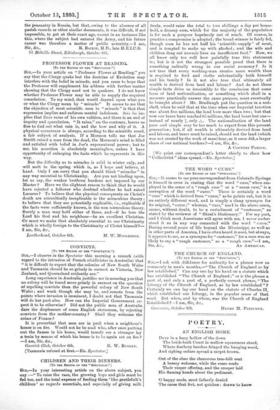CHILDREN AND THEIR DINNERS.
IVO THE EDITOR OF THE "SPECTATOR.']
SIE•jill your interesting article on the above subject, you say :—" To raise the race, the growing boys and gills must be Led too, and the total expense of feeding them like gentlefolk's dbhildren' as regards essentials, and especially of giving milk freely, would raise the total to two shillings a day per house- hold, a dreamy sum, which for the majority of the population is for such a purpose hopelessly out of reach. Of course, in practice a compromise is adopted; the bread-winner is fairly fed, though even be has not half his scientific supply' of meat, and is tempted to make up with alcohol ; and the wife and children drag out anremic lives on insufficient food." Now, we all know only too well how painfully true this statement is ; but is it not the strongest possible proof that there is something radically wrong in our social economy P Is it not true that every working-man creates more wealth than is required to feed and clothe substantially both himself and his family ? Is it not also true that ultimately all wealth is derived from land and labour? And do not these simple facts drive us irresistibly to the conclusion that some form of land nationalisation, or something which shall in a measure practically answer the same purpose, must eventually be brought about ? Mr. Bradlaugh put the question in a nut- shell, when he said that at the time when our Imperial taxation was about five millions, the land bore more than two ; but that now our taxes have reached 85 millions, the land bears but one— instead of nearly 1, only The nationalisation of the land pure and simple may be too much to expect from this present generation ; but, if all wealth is ultimately derived from land and labour, and taxes must be raised, should not the laud (which was not created by the work of man) bear, as it once did, a larger share of our national burdens F—I am, Sir, dro.,
A COUNTRY PARSON.
[We print our correspondent's letter chiefly to show how "Collectivist" ideas spread.—En. Spectator.]


































 Previous page
Previous page